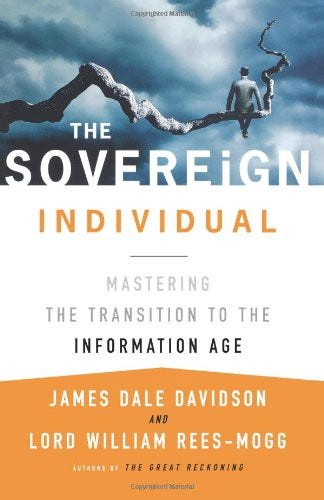Our Transition to the Information Age
A review of the Sovereign Individual
A review of the Sovereign Individual
“The future is disorder. A door like this has been cracked open five or six times since we got up on our hind legs. It is the best possible time to be alive, when almost everything you thought you knew is wrong.” — Tom Stoppard, Arcadia
The very first sentence of The Sovereign Individual states “The coming of the year 2000 has haunted the Western imagination for the past thousand years” and by doing so sets the tone for the rest of this book. The overall thesis can be summed up by saying that we are entering the fourth stage of a human society that is governed by the Information Age, where individuals become liberated due to faster micro-processing power and economic transactions occur outside of government regulatory confines due to digital money. Because of this, the transition will subvert and destroy the nation state as we know it and create new forms of social organization and violence.
This is not the first time human beings have witnessed the collapse of an institutional monopoly due to widespread economic and social changes. The first was in the 15th century as the Church, which had been in a position of unchecked power for centuries, fell due to the technological revolution of the 1400’s. This revolution brought new power to how information could be distributed and ultimately lead to the creation of mass communication. This altered society with the ability for unrestricted information, leading to revolutionary ideas being able to transcend borders. The Information Age will bring about more sweeping change but will do so with incredible speed and efficiency.
Two very important things stood out to me after I had finished reading the book. The first was the amount of forecasts the authors, James Dale Davidson and Lord William Rees-Mogg, had thought deeply and written about. The second is that the book was published in the late 1990’s, meaning many of its forecasts are no longer just thought experiments written down on paper but are actual events starting to play out in the world around us. These events include:
Changes in economic organization arising from the impact of micro-processing.
Recognition that the nation-state is becoming obsolete which is leading to wide-spread movements to secede.
A decline in the status and power of traditional elites as well as the decline in respect for traditional symbols and beliefs of the nation-state.
An intense and even nationalist reaction brought about by those who have lost their status, power, and income in this new world.
These are just a small number of important ideas that play out in the book and another incredibly important one is the prediction of digital currency. In fact, the book predicted the use of what would become modern cryptocurrencies such as Bitcoin, Ethereum, Z-Cash, and many others. Here is just one of many quotes about digital currency in the book:
“In the new millenium, cybermoney controlled by private markets will supersede the fiat money issued by governments.”
While the book may have an overall aura of doom and gloom, that could be further from the truth. What readers should hopefully walk away with is an overall idea on how to survive and profit in the fast changes of the Information Age. And it is especially important for those who want to remain financially independent.
The economy that is being created in the Information Age is already having massive implications for culture and media as people are now able to choose what news they want to consume, where they consume it, and where they get their news from. We have already witnessed this in the past year in both the Brexit campaigns and the U.S. presidential elections; people are beginning to trust the mainstream media less and less as mass media becomes the individualized media.
What the book talks about the most though are the changes and ramifications to the political and economic structures of the nation-state. For example, one large effect of the new age will be the reduction of hiring large numbers of knowledge workers to monitor production processes. Because of this, we will start to witness employment become more temporary and situational as virtual corporations will assemble talent for specific purposes more efficiently. This will lead to large corporations, that provide the services and products we all want, to be managed not from a central headquarters, but through a decentralized network.
The political implications this book talks about and predicts are worth reading now, even almost 20 years later. It is jarring how prescient most of the forecasts in the book have played out or are starting to play out. This is required reading for anyone trying to understand the events that are playing out around us in the world today.


